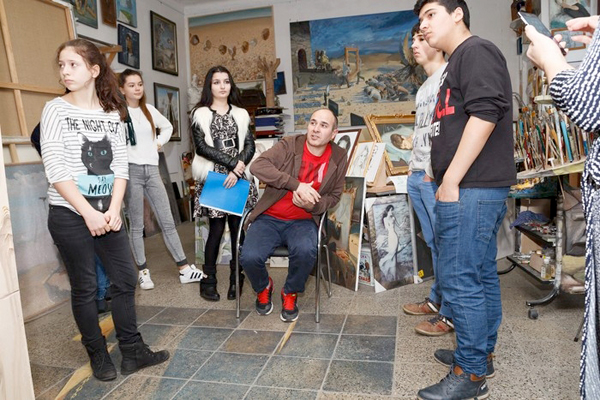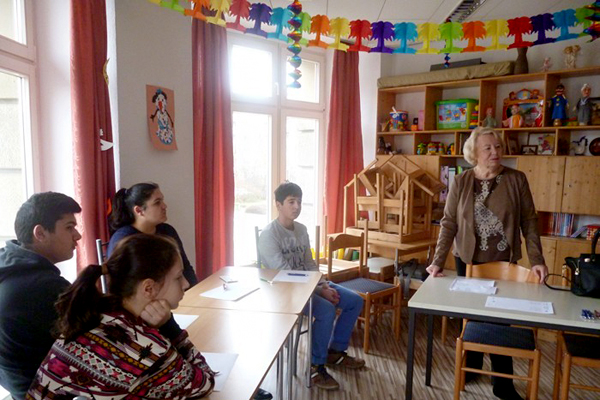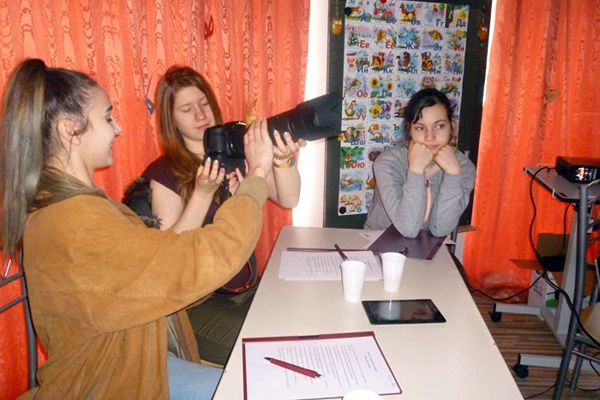Under the auspices of the Federal German Ministry of Education and Scientific Research at the St. Alexandra German-Russian Association in the framework of “Culture Makes Stronger” program (Kultur macht Stark) a project “Leipzig Now and Then” started. Its arts program is wide and is connected with integration and active bilingualism.
A group of project participants of 14 to 18 years old was offered to prepare interviews with their compatriots that have successfully assimilated into the German society. At the first stage (Medienworkshop), they were to master the basics of journalism, principles of collecting and processing information, preparing photo and video materials under the guidance of experienced instructors - a professional journalist, a graduate of the Ural University Alita Librecht and chief editor of Leipzig Russian magazine “Most”, photographer Michail Vashchenko.
The young correspondents were offered an entire gallery of heroes to “test the pen”: a “day mom” (teacher in a home kindergarten), a sewer, a programmer, a business-consultant, a physiotherapist, owners of travel agency – specialists, who answered the questions about the secrets of their profession and their experience of integration.
This is what 14-year-old Eva Zaslavskaya wrote:
“Vladimir Shapiro and Zhanna Gribova came with their little daughter in 1994 from Saint Petersburg. They opened the first and only Russian tourist agency in Leipzig up to now, offering journeys around all Europe.
Their business started in 1996... Now, “Lita” agency is widely known in Leipzig. Vladimir Shapiro became a great guide with wide knowledge of history, geography, culture of cities and countries that he represents. He speaks great Russian, guides groups not only from Leipzig, but also their guests from Russia and Ukraine. His already grown up daughter Masha guides tours in German”.
Children’s special interest was kindled by visiting a creative workshop of a member of the German Artists’ Union Zamir Yushev, born in a small Dagestan town Khasavyurt, who has lived and worked in Leipzig for 20 years now. A 16-year-old Albika Gadzhiyeva interviewed him.
«– Where do you get ideas to create your works?
– Ideas come suddenly, sometimes I just sit alone in silence, or drive my car, walk, travel, meet interesting people – all of this can trigger a new work.
– When young, you won many martial arts competitions, you had a “black belt”. What is your attitude towards sports now?
– Show me a Caucasian, who does not like martial arts, boxing or karate!, with the modesty natural to him said the artist. – I was young, but it didn’t come handy. Now I need sports for good health, to support energy…
Within three days of their work, every participant has interviewed at least three persons, made voice recordings, photos and videos under professional guidance. Young journalists could use both German and Russian, which increases the chances to assimilate, giving the bilingual experts undeniable advantages over their colleagues.
The second stage was intense as well. It was connected with the city’s musical culture. A tour to the Leipzig “notes footsteps” guided by a famous regional ethnographer Elizaveta Tumim, visiting the legendary Bach, Mendelssohn-Bartholdi museums, getting acquainted with the musical history of Gewandhaus and the Opera Theatre, connected with such great names as Chaikovsky, Rubinshtein, Rakhmaninov, offered the children a great opportunity to broaden their horizon and to get a good language practice. Works of German and Russian composers were performed during a final solo recital of singer Kristina Bernhardt.
Now, young correspondents are actively preparing material for the final exhibition, planned for the end of March.
“We are very pleased, that our new project has evoked such a warm response and highlighted the participants’ creative abilities”, said the head of the Association and the project manager Nadezhda Oppenlender. “We hope that they have enriched their views of modern life and the effort needed to integrate successfully. And what is most important – about the advantages of bilingualism, as most of our participants are bilingual. We often hold educational events, find connections between Russian and German cultures, new forms of interaction with people of all ages, most of them – our ex-compatriots. The “Leipzig Now and Then” is one more proof to this.
The best journalist materials, photos and videos prepared during the project will be shown at the exhibition, which will be on display in the New Rathaus – the city’s main administrative building – in June.










